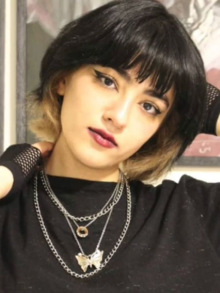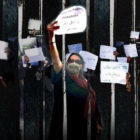Protests in Iran
October 7, 2022
On September 13, in Iran, a 22-year-old woman named Masha Amini was arrested for having an “improper hijab.” In that same week on September 16, Amini was killed in police custody. Beaten by Guidance Patrol, she had died from a head injury. After this horrific event, protests began to break out in Iran protesting the killings and modesty in Iran.
Police have been known for their seemingly arbitrary standards and punishments of women for decades. In less than three weeks more than 1,200 people have been arrested along with 92 members of civil society who weren’t arrested in the streets, but their homes and workplaces.
A 16-year-old girl named Nika Shakarmi vanished during a protest in Iran. After a week passed with no sign of her, security forces delivered Shakarami’s dead body to her family with a smashed skull and a broken nose. Her mom said that the police officials had kept Shakarami’s death a secret and took her body from the morgue and buried her in a remote area. Iranians were in a rage about Shakarami’s death. Protest became more intense as disruptions occurred, Iranians were beaten, arrested, and some demonstrators were killed.

As of October 6, human rights organizations have estimated that dozens of protesters had been killed over the past three weeks. On September 30 it was said that 66 people, including children, had been killed, while hundreds were wounded after police forces fired live rounds at protesters, bystanders, and worshippers in a violent attempt to have the protesters back down.
I spoke to ERHS junior, Isolde Cledera, to hear her perspective on these events.
“The police officials are inhuman,” Cledera said. “What their doing isn’t right. Children are dying because the police people that are supposed to protect them, are killings them. Iranians shouldn’t have to worry that one day there going to be killed because of their hijab or their clothes, no one should have to worry about that.”
Another ERHS student, junior Marissa Castor shared what her thoughts were on what’s happening in Iran.
“It’s sad that Iranians are fearing for their lives in their country,” Castor said. “Parents are having to bury their children, that shouldn’t be a thing. These killings shouldn’t be the first thing you hear about in the morning.”

